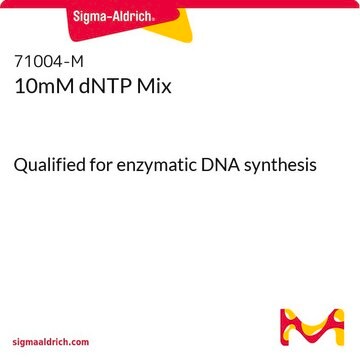H0268
Hexanucleotide Primers
lyophilized powder
Bejelentkezésa Szervezeti és Szerződéses árazás megtekintéséhez
Összes fotó(1)
About This Item
UNSPSC kód:
41106305
NACRES:
NA.51
Javasolt termékek
Egyéb megjegyzések
Hexanucleotide primers are a mixture of random 5′-hydroxyl hexanucleotides or hexamers, and can be used to quickly and efficiently prepare radioactive or non-radioactive probes using a DNA polymerase and a suitable DNA template.
Egység definíció
1 A260 unit = approx. 20 μg
Tárolási osztály kódja
11 - Combustible Solids
WGK
WGK 3
Lobbanási pont (F)
Not applicable
Lobbanási pont (C)
Not applicable
Egyéni védőeszköz
Eyeshields, Gloves, type N95 (US)
Analitikai tanúsítványok (COA)
Analitikai tanúsítványok (COA) keresése a termék sarzs-/tételszámának megadásával. A sarzs- és tételszámok a termék címkéjén találhatók, a „Lot” vagy „Batch” szavak után.
Már rendelkezik ezzel a termékkel?
Az Ön által nemrégiben megvásárolt termékekre vonatkozó dokumentumokat a Dokumentumtárban találja.
Az ügyfelek ezeket is megtekintették
Methods for non-radioactive labeling of nucleic acids.
Kessler, C. et al.
Nonisotopic Probing, Blotting, and Sequencing, 51-54 (1995)
Bernhard Reuss et al.
The Journal of neuroscience : the official journal of the Society for Neuroscience, 23(16), 6404-6412 (2003-07-25)
Multiple evidence suggests that fibroblast growth factors (FGFs), most prominently FGF-2, affect astroglial proliferation, maturation, and transition to a reactive phenotype in vitro, and after exogenous administration, in vivo. Whether this reflects a physiological role of endogenous FGF is unknown.
Sambrook, J., et al.
Molecular Cloning: A Laboratory Manual, 10-10 (1989)
A P Feinberg et al.
Analytical biochemistry, 132(1), 6-13 (1983-07-01)
A technique for conveniently radiolabeling DNA restriction endonuclease fragments to high specific activity is described. DNA fragments are purified from agarose gels directly by ethanol precipitation and are then denatured and labeled with the large fragment of DNA polymerase I
S Bauer et al.
The Journal of neuroscience : the official journal of the Society for Neuroscience, 23(5), 1792-1803 (2003-03-12)
The mammalian olfactory epithelium (OE) is composed of primary olfactory sensory neurons (OSNs) that are renewed throughout adulthood by local, restricted neuronal progenitor cells. The molecular signals that control this neurogenesis in vivo are unknown. Using olfactory bulb ablation (OBX)
Tudóscsoportunk valamennyi kutatási területen rendelkezik tapasztalattal, beleértve az élettudományt, az anyagtudományt, a kémiai szintézist, a kromatográfiát, az analitikát és még sok más területet.
Lépjen kapcsolatba a szaktanácsadással















